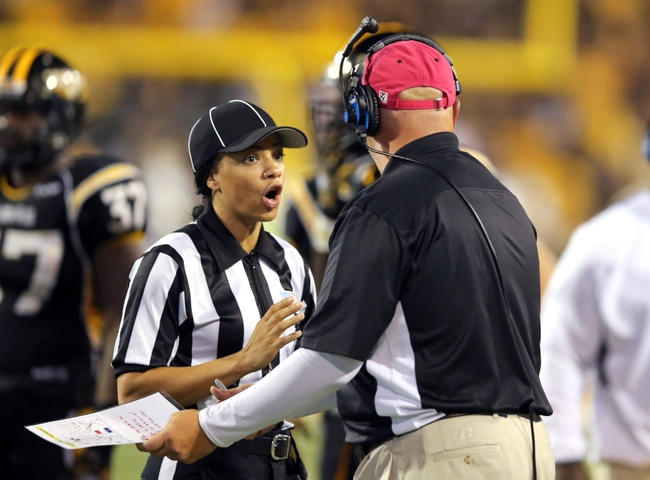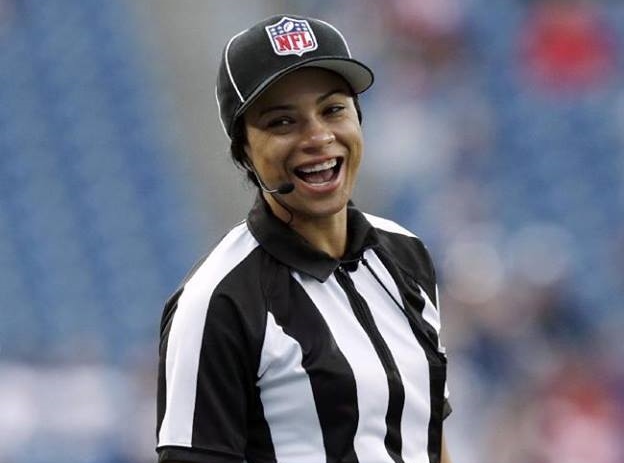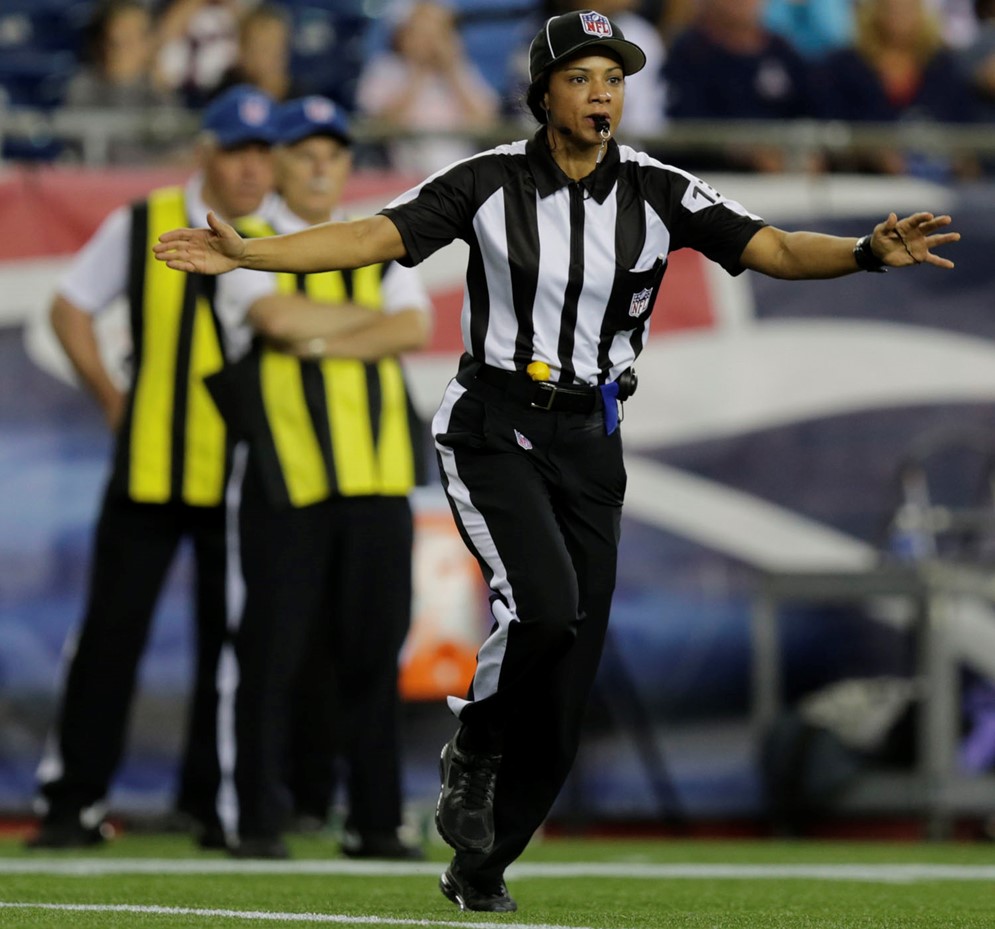
Good Morning POU!
It’s that time of year again! 
This week we’ll feature sistahs working in various aspects of the National Football League – and not as scantily clad eye candy gyrating on the sidelines! The first featuree is an HBCU alum trailblazing her way through the NFL’s prestigious officiating crews.
To foster its next generation of permanent officials, the NFL runs an “Advanced Development Program” for twenty-one officials who have excelled at the college level. As the league describes it, “these officials — who are among the very elite of collegiate officiating — are evaluated by the league to answer one question: Do they have the potential to succeed in the NFL?”
Among those under evaluation is Maia Chaka, a physical education teacher from Virginia Beach. Chaka was named to the prestigious program last offseason following in the footsteps of, among others, fellow Conference USA official Sarah Thomas who has been an NFL official-in-training since 2013.
Growing up in Rochester, N.Y., Maia Chaka played “pretty much every sport under the sun” — except football.
“After all my playing days were done, officiating was a way of staying involved in sports,” Chaka said. “I chose football because I was never able to play it.”
Chaka, a physical education teacher at a school for at-risk students in Virginia Beach, Va., began officiating at the high school level. After five years of working varsity-level games, she attended an officiating camp, where she caught the eye of a former NFL official, Gerald Austin, now the supervisor of officials for Conference USA. Austin invited her to officiate an East Carolina University scrimmage.
“It was basically a job interview or an audition,” she said.
She passed the audition. Austin hired her immediately after the scrimmage.
In 2014, as she entered her eighth season in stripes, Chaka was invited to join the NFL’s Advanced Development Program (ADP). ADP officials — the top non-NFL officials in the country — are the first to be considered to fill openings on NFL crews. As an ADP participant, Chaka is mentored by veteran NFL officials, works minicamps, attends clinics and officiates a preseason game.
“I’ve gotten so much feedback,” she said. “But the main thing is to always be calm. Control what you can control. Go out there, be confident and own your position.”
In 2014, Chaka got her first NFL experience as back judge for a preseason game between the New England Patriots and the Philadelphia Eagles. She admits that looking up at the numerous Super Bowl banners proudly hanging in Gillette Stadium was “surreal,” but once play began, it was just another game.
“You never know where you’ll end up if you try doing something,” she said.
As one of the top officiating prospects in the country, Chaka could become the first permanent female official in the NFL. But while she knows her potential place in league history, she makes one thing clear: “I’m an official first.”
Chaka continues to improve her knowledge of the rules, mechanics and skills at the college level. She knows that if the NFL comes calling, she’ll be ready.
In March, The Football Girl’s Melissa Jacobs sat down with Maia to find out more about this trailblazer’s life and aspirations.
Melissa Jacobs: Did you grow up playing sports, and what were your favorite sports to watch?
Maia Chaka: Growing up I played everything competitively except for football. In high school I played basketball, ran track, tennis, volleyball and more. I even tried golf but it didn’t work out because it was the same season as softball. I tried lacrosse at a community college in Finger Lakes, where I also played basketball.
Football was always my number one sport to watch.
MJ: At what point did football rules interest you?
MC: When I was undergrad at Norfolk State, I had a work/study job in intramural sports where I had to line the field for flag football and make team brackets. I was involved in the administration process of flag football but I never officiated until I graduated and became a physical ed. teacher. Another teacher I worked with at the time introduced me because he was officiating on the high school level.
My first year of officiating was 2007. I first did J.V. [junior varsity], middle schools, but also Pop Warner. I pretty much worked every level. As soon as I got the gist of the rules, I was hooked. I was working four games a week and then at the end of my first year, I got a break and was able to work my first varsity game.
MJ: How did you rise so quickly from high school to Conference USA games?
MC: After my first season, there were a lot of local guys in the high school association that also worked the college level for the CIAA [Central Intercollegiate Athletic Association] or the NEAC [North Eastern Athletic Conference] around our area. They gave me a college rulebook and told me to study. I guess they saw something in me that I didn’t know at the time.
I was approved to work with a crew after my second year in high school and everyone on that crew also worked college football on Saturdays so they started teaching me mechanics of what you need to ref on a Saturday. Once that happened, they’d invite me out to work scrimmages at Norfolk State and Hampton. I worked scrimmages for a whole two years before I even tried out for Conference USA.
MJ: After you were hired by Conference USA, were you immediately eyeing the NFL? Or were you just happy to exist in the college ranks?
MC: This is the way I look at it: With anything I do, I always try to make it to the top. Or course I had aspirations to try and work in the NFL young but I knew that would have been a long shot. There were barely any women working college. So my long term goal was to get somewhere in the NFL, but I wanted to take it step by step and make sure I mastered what was in front of me first.
MJ: How did players and coaches react to you when you officiated your first Conference USA game?
MC: It helped that Sarah Thomas had already been officiating for the conference for three years so they were used to having a female official on the field.
For me, the big differences were the speed and the fans. I went from working games with maybe 100 or 200 people in the stands to 30,000. And there are other nuances like instant reply and just generally knowing the rules and being able to communicate to coaches.
MJ: How influential has ex-NFL official and current Conference USA officiating coordinator Gerald Austin been in your career?
MC: So influential. He’s the reason why I’m where I’m at today. He saw me at a college clinic when I was still working high school ball and gave me the opportunity to try out for Conference USA. He gave me a shot and I was able to work my first Division I game straight out of high school. Most officials go to Division II, Division III or JuCo [junior college] first.

MJ: What’s the process for joining the NFL’s officiating developmental program? Is it something you apply for? Do you just get a call out of the blue one day?
MC: Once you start to work college, there are scouts, people who grade your film. There are people who train you, and those trainers are pretty much all NFL staff. They look at everyone and identify who has potential. In my case, a lot of it was a big push from Gerald Austin saying he had a young official on his staff, and he threw my name in the hat. They watched me, how I progressed throughout my college career. After my third season of Conference USA, and after I worked a bowl game, I got a call to come in for an interview.
MJ: Are you interviewing with [Head of Officiating] Dean Blandino or someone else, and do they grill you on rules and situations?
MC: You interview with Dean Blandino and about nine other supervisors who are in the room. They surround you and start firing off questions. Once you get to that point they already know what you know. What they are really looking for is if you have the personality to make it.
MJ: How would you describe the ideal NFL official personality?
MC: You have to be fair and even-tempered. You can’t let things bother you. You know coaches are going to yell and speak their mind. You know players are going to do the same thing. You can’t take that personally.
MJ: After the announcement that you, along with Sarah, were named to the developmental program last year, almost every story I read contained the words “trailblazing” or “glass ceiling.” How do you feel about your gender being mentioned so often?
MC: It’s crazy. I don’t like to bring it up or make anything out of ‘I’m a woman and I’m an official.’ I think of myself of an official first who happens to be a woman. At the same time I understand the responsibility it carries because there aren’t many of us out there doing it. I understand that every time I step onto the field or speak to someone, I’m not only representing myself but I’m representing the National Football League, Conference USA and women in America. I understand the responsibility it carries and I don’t mind it at all. But I’m not doing this to be the first woman or one of the first women; I’m doing this because I love the game.
MJ: You’re a head linesman. For those that don’t know, which I’m guessing is just about everyone, can you explain your job function?
MC: The first thing I look for is forward progress which means I’m responsible for marking first downs, placing the spot where the next snap will go into play. I also look for any fouls that will keep a play from going – false starts or defensive offsides. I also have primary responsibility for communicating any information to the coaches since I’m right there. I also have to make sure and give the coach his options when there’s a foul. I pretty much do everything on the field except go on television and announce the penalty.
MJ: How did NFL players, coaches and fans react to you in action last preseason?
MC: When I first went out they were very receptive. They congratulated me – they weren’t used to seeing many women in that role and certainly not an African American. Once that was done they wanted to make sure I knew what I was doing.
I think there were some coaches who were a little harder in practice but I think that was more as a test since I was unfamiliar to them.
MJ: What happens after the preseason games when you’re in the developmental program? Does Blandino sit down and evaluate your performance, or is more of a ‘thanks, see you next offseason?’
MC: After the preseason games we just go back and work our college schedule. What they want to see throughout the next season is what the program has done for us. Are we improving as college officials? They want to see if we’re being leaders.
Once we finish our college season, we’re invited back to work a senior all-star game, like the Senior Bowl. After that game they give us a year-end evaluation, tell us what they think about us and if we’re going to stay in the program, if we’re ready for the NFL or if we’re no longer wanted in the program.
MJ: So are you still in the program?
MC: I’m still in the program. I’m safe.


